Libya and World Oil Exports
Posted by Luis de Sousa on February 21, 2011 - 1:47pm
This is a repost of an article that ran on The Oil Drum: Europe about two years ago. Today's events warrant another look at Libya's role in world oil production, past and future.
Some History
From time immemorial, the territory that is now Libya has been part of one empire or another--whichever empire had control of the southern Mediterranean at the time. The Umayyad Caliphate reached the area in the VII century. This resulted in the conversion of much of the population to the Islamic religion and culture.
The territory entered the XX century under the rule of the Ottoman Empire, but was invaded by Italy in 1911. A resistance war ensued that would last until the end of World War II. Libya became a de facto colony of Italy during that time.
At the end of World War II, Italy renounced its claims over Libya in the peace treaty it signed with the Allies. The territory was briefly ruled jointly by the UK (with the provinces of Tripolitania and Cyrenaica) and France (with Fezzan).
In 1949, Cyrenaica became an independent emirate ruled by Emir Idris Sanusi (a resistance leader between the two World Wars). Nevertheless, in the same year the United Nations ruled in favour of a united country covering all the three provinces. In 1950, a national assembly gathered at Tripoli and designated Emir Idris Sanusi as the king of the state to be. The following year, a Constitution was established and King Idris declared the independence of the United Kingdom of Libya. Parliamentary elections were held in 1952.
Soon after the new Kingdom was created, first the UK and then the USA obtained rights to build military bases in Libya. In 1956, the first concessions on oil exploration were granted to foreign companies, and in 1959 the first successful drilling was reported. Libya became an oil exporter in 1961 with the completion of a 167 Km pipeline. This started a spectacular production rise that would surpass 3 Mb/d in 1969.
 |
| Figure 1 – Colonel Gaddafi soon after taking power. |
Overnight, Libya went from being one of the poorest nations in the World to one of the richest, when measured based on average GDP per capita. But equity was lacking, and popular resentment grew as oil exports grew. In 1969, a small group of young military officers staged a successful coup d'état and deposed King Idris. Their leader, Colonel Muammar al-Gaddafi, became the country's ruler at the age of 28.
Gaddafi intended to build an ad hoc socialist state and promote Arab unity. Banks were nationalized in 1969. The following year, the oil industry was nationalized, all the foreign troops left the country, and a new Constitution established. Plans were made for Libya to merge with Egypt, Sudan and Tunisia, but none of this actually transpired. Between 1969 and 1972, Libya's oil production fell 1 Mb/d. In 1973, Libya played an active role in the oil embargo to the USA, and production dropped even further to 1.5 Mb/d.
Libya's performance during the embargo, its support for Arab unity, and its opposition to western interests in Islamic states made it a pariah to the western world. Libya even supported revolutionary organizations that do not restrain terrorist actions--something the western world could not accept. During the 1970s, Gaddafi successfully dealt with several attempts to undermine his regime, coming from both inside and outside the country.
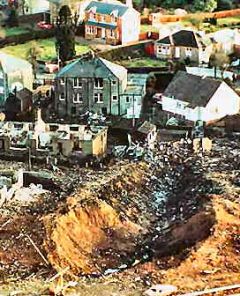 |
| Figure 2 – Crash site of Pan Am flight 103. The bombing killed a total of 270 people inside the aircraft and on the ground. |
In 1982 the USA imposed a unilateral embargo against Libya, and in 1984 the first serious assassination attempt on Gaddafi took place. Two years later, the USA bombed Tripoli and Benghazi, most likely with the objective of eliminating Gaddafi. One of his sons died in the attack. In 1987, a French airliner was destroyed over the Sahara. The next year, Pan Am flight 103 exploded over the Scottish town of Lockerbie; Gaddafi's regime is implicated on both actions. Oil production declined to just over 1 Mb/d.
As consequence of the regime's involvement in the Lockerbie affair, the United Nations imposed a set of sanctions against Libya in 1992. The country was asked, among other things, to hand over perpetrators for trial and to compensate victims' families. Gaddafi did not comply with any of these requests, relegating the country to international isolation. Nonetheless, oil production grew to 1.4 Mb/d and remained there until the turn of the century.
In 1999, Libya handed over the requested perpetrators. By the end of 2003, the remaining UN requirements had been fulfilled. In 2003, the country also announced its intention to decommission its programs of weapons of mass destruction. Since 2003, Libya has collaborated with several international organizations to accomplish that goal. In 2004, the UN lifted all sanctions against Libya. With these changes, cooperation with international oil companies began strengthening again.
By late 2007, Gaddafi travelled to Lisbon to represent Libya at the II EU-Africa Summit. He immediately caught the attention of journalists by taking an active part in the Summit's proceedings and showing great agility in dealing with other heads of state. At the close of the Summit, Gaddafi proposed that Libya host the next Summit, which will take place in 2010.
The country's oil production has steadily increased since sanctions were lifted, now approaching 1.9 Mb/d. In the first part of September 2008, Libya received an official visit from US secretary of state Condoleezza Rice, a moment that seems to have sealed the country's full reintegration with the international community.
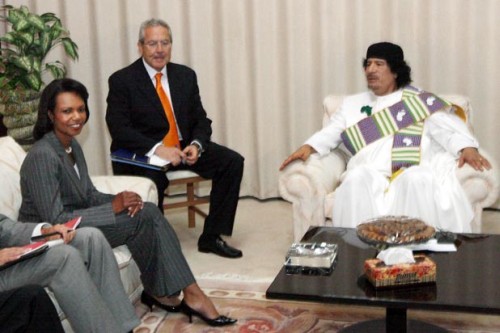
Figure 3 – Condoleezza Rice and Muammar Gaddafi in Tripoli. Photo by Mahmud Turkia, AFP / Getty Images.
For a deeper insight into Libya's History:
Libya at Country Studies by the Federal Research Division of the Library of Congress of the USA.
Background Note at the U.S. Department of State Bureau of Near Eastern Affairs.
Historic timeline at the LookLex / Encyclopaedia .
Production
Libya is now a mature oil-producing region with most of its oil fields discoveries occurring during the 1960s. Slowly, discoveries have become smaller, with little oil being found after 1990. In ASPO's newsletter 34 [pdf!], published in 2003, Colin Campbell showed discovery the following way:
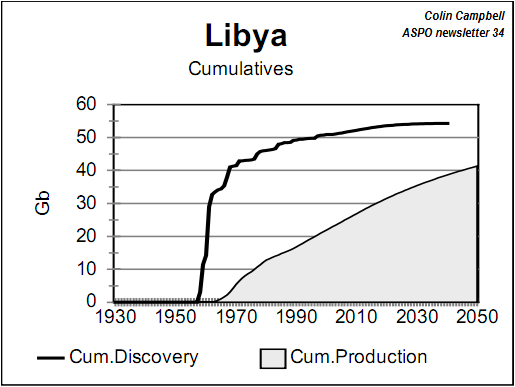
Figure 4 – Libya Cumulative Oil Discovery.
Discovery by then summed up to 52 Gb, of which 23 Gb had already been extracted. During the previous years discovery had averaged 0.1 Gb per annum, leading Campbell to point to an ultimate discovery of 55 Gb.
Figure 5 – Libya's oil fields. Source: ENI, click for full version.
In ASPO's IV International Conference, held in 2005, Jean Laherrère showed [pdf!] an assessment of Libya, noting that different databases were presenting different scenarios. While IHS data trended to an ultimate of 60 Gb, Wood Mackenzie was showing 40 Gb. The creaming curve also demonstrated the unreliability of OPEC's data.
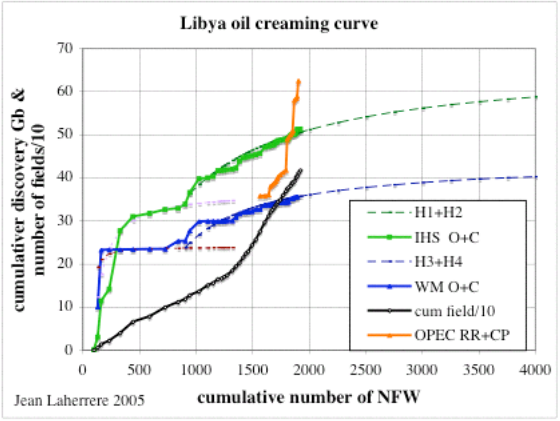
Figure 6 – Libya Oil Creaming Curve from IHS and Wood Mackenzie data.
At the end of 2007, the amount of oil produced by Libya had already surpassed 27 Gb. Considering that production had been in a plateau of around 1.4 Mb/d since 1990 and started increasing after 2003, the lower figure of 40 Gb seems unlikely.
Several production forecasts are available for Libya. Richard Duncan and Walter Youngquist projected a peak of about 2.3 Mb/d occurring about now, after which a slow decline would ensue, accelerating after 2020.
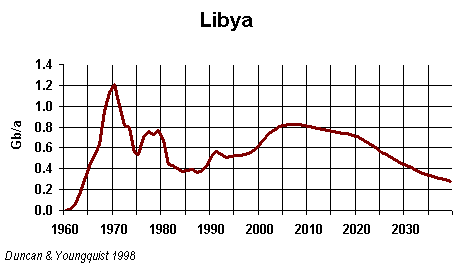
Figure 7 – Libya Oil Production forecast by Richard Duncan and Walter Youngquist in 1998.
In ASPO's newsletter 34 Colin Campbell projected a production plateau of around 1.4 Mb/d, lasting until 2010, when a gentle decline would set in. For an ultimate recovery of 55 Gb that may seem a rather conservative projection, but at the time the openness showed by the OECD towards Libya in the following years was likely difficult to foresee. (In 2003, the country was still on the US's list of terrorist-supporting states.) In 2007 production reached 1.85 Mb/d.
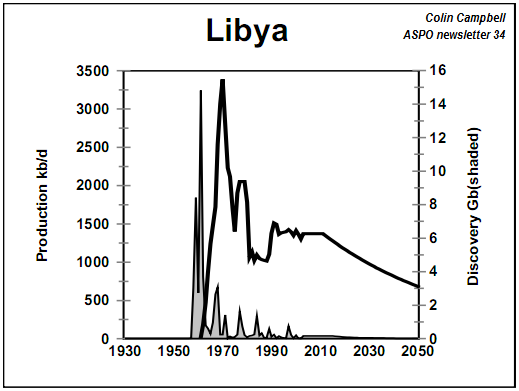
Figure 8 – Libya Oil Production forecast by Colin Campbell in 2003.
Jean Laherrère's projection is more reflective of the new reality that emerged after 2003. Two logistic curves give shape to the different ultimates given by IHS and Wood Mackenzie, one peaking by 2010 at 2.2 Mb/d, the other by 2020 at 3 Mb/d.

Figure 9 – Libya Oil Production forecast by Jean Laherrère in 2005.
While 40 Gb now looks like too small a figure for Libya's ultimate, a production peak of 3 Mb/d would probably represent too much of a departure from Ghadaffi's long lasting conservationist policy towards oil. In that sense, Duncan and Youngquist's forecast seems to be the one better reflecting Libya's strategy, even if probably presenting a production peak too soon.
In light of the information gathered here, an alternative projection is proposed, trying to both reflect the country's policy and the favourable developments in latter years regarding foreign relations. The 55 Gb ultimate is adopted, meaning that Libya is passing its mid point of depletion in 2008. Production is allowed to rise slowly towards a peak of around 2.2 Mb/d a decade from now after which a gentle decline sets in (with cumulative production reaching 35 Gb by then). To describe this profile a logistic curve is used (if for nothing else, for historical reasons). The model proposed shows Libya continuing to produce over 1.6 Mb/d in 2030.
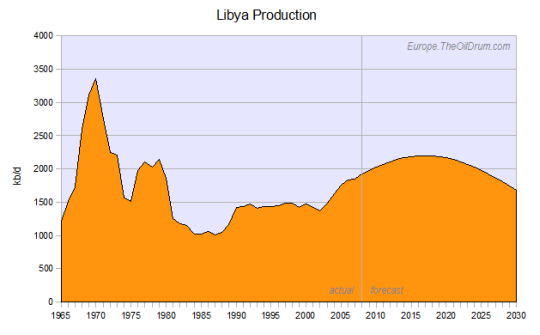
Figure 10 – Libya Oil Production forecast. Click to enlarge.
Consumption
After World War II, Libya experienced incredible population growth. The population grew from 1 million in 1950 to 5 million in 2000, and presently tops 6 million. This represents a six fold increase in less than sixty years. The UN forecasts this growth (that has followed a nearly linear trend) to continue until 2020 before slowing down. In 2025, the country is expected to reach 8 million people, and by 2030 will have close to 8.5 million people.
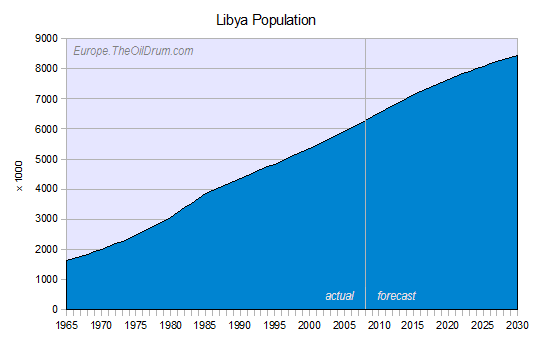
Figure 11 – Libya Population forecast, according to UN's forecast.
In spite of political turmoil and difficult foreign relations, Libya has shown a stable path of oil consumption, growing from 5.5 b/cap/a in 1965 to over 17 b/cap/a in 2007. During times of low oil prices this trend slows down or stalls, just to return to the previous pace some years later. During the price crash of 1998, consumption per capita receded, picking up again with the first hikes after 2000. Since 2003, oil consumption per capita has steadily risen around 2.5% per annum.
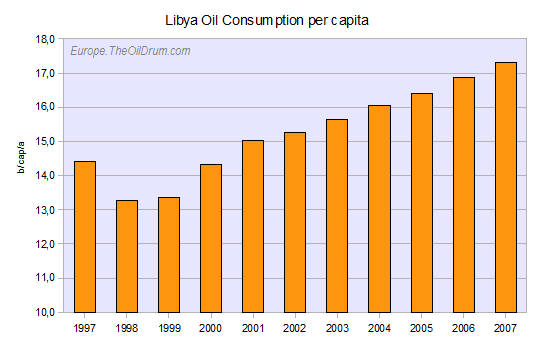
Figure 12 – Past Libya Oil Consumption per capita.
Consumption per capita is forecast to continue to rise at 2% per annum until production peaks. By then this trend will start slowing down due to depletion concerns, falling to 1% per annum by 2030. This projection takes consumption per capita to over 25 b/cap/a in 2030, still below many of the rich exporting countries, but equalling US consumption today.
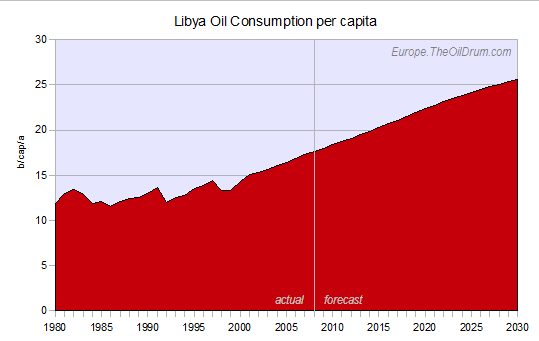
Figure 13 – Libya Oil Consumption per capita forecast.
Using this consumption per capita model and UN's population growth projections, the country's oil consumption is set to increase two-fold during the next two decades. While consumption growth will visibly slow down, it should top 0.6 Mb/d soon after 2030.
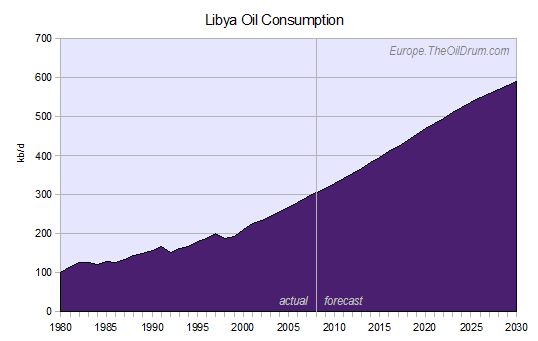
Figure 14 – Libya Oil Consumption forecast.
The country's maturity both as an oil producer and as an integrated member of the international community assures a minimum degree of accuracy of the projection made here. Historical data does show, however, that a marked and prolonged fall in international prices (for example, imposed by recession) could change the picture markedly. Being a member of OPEC, production quotas could be lowered, and as seen from past data, low oil prices usually have a visible impact on consumption.
The Macroscopic View
Even with the increased consumption projected here, Libya remains as an important oil exporter for the period considered.
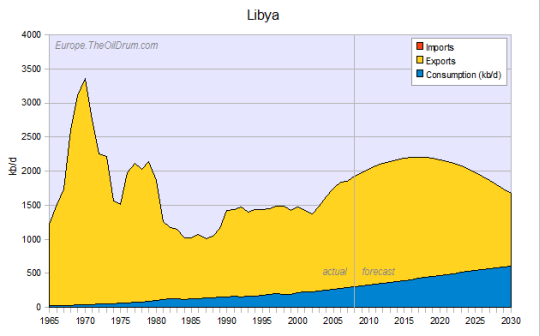
Figure 15 – Libya Oil Exports forecast. Click to enlarge.
There is much irony in Libya's history as an oil producer. If Colonel Gaddafi hadn't reached power, the country probably would have extracted most of its oil during times of cheap energy (as happened in most of Europe). While the country was forced into isolation for decades, Libya now reaches the XXI century with half of its oil reserves to extract and healthy foreign relations, looking set for what maybe the country's Golden Age.
With one more country assessed, World Oil Exports (WOE) remain little changed. 2005 continues to be the peak date, now with nearly 39 Mb/d of oil traded internationally. The fast decline in the second decade of this century continues to be present, falling from over 36 Mb/d in 2011 to under 26 Mb/d by 2020.

Figure 16 – World Oil Exports as of September 2008. Click to enlarge.
Previous analyses of WOE:





Brent's over 105 dollars. WTI surged over 5 dollars in a day.
I'm reading reports that several oilfields are already down, either because of strikes or unrest.
If this continues for long we may be headed for a crash, although I doubt it. The West needs the oil too much and will hasten the Colonel's death knell if needed.
There's no 'balance' to be treaded here. On the other hand, a Libya without Ghaddafi is a Libya which is unpredictable and hardly secular or even democratic. Probably something like Syria will emerge from the rubbles and it will be harder to negotiate the oil with a more hostile regime.
The neorhetoric aside, the West has moved much closer to Libya in recent years as Ghaddafi stopped with the terrorfunding. Will that process now be reversed?
And was there any evidence that Libya was terror-funding - at least in recent years? Little if any, that I'm aware of. Ghaddafi, as far as I can tell, agreed to adopt the rhetoric of the Bush-Blair cabal, and to accept nominal responsibility for the Lockierbie outrage, purely as an expedient to save his own skin
- to get Libya out of the cross-hairs of the US government and military
- to restart international trade for his country
Ghaddafi is certainly a deeply unsavoury character, but the evidence that convicted Al-Megrahi of the Lockerbie bombing was extraordinarily flimsy. If another Lockerbie happened tomorrow, the same techniques would, IMHO, be used to obtain conviction of an Iranian, as a representative of the current bogeyman "terrorist-funding" state.
Anyway, I notice my earlier comment (which was intended mostly as as humour) has been deleted by a mod. Apologies, I accept the right of the mods to do that. This one may well go the same way.....
I'll shut up now, and let the discussion about exports and prices get into gear.
Regards Chris
I thought it was very funny - at risk of being kicked out:-(
I agree with your comments re Al-Megrahi. A scape goat was needed. But Libya did provide vast amount of weaponry for the IRA.
But what is going on now is different. The bad guy turned good guy getting booted out by the people. Is this going to be good or bad for OECD? Taking N Africa as a whole, they provide Europe with loads of oil and gas. Will democracy be better for OECD than stable dictatorship?
They also shot WPC Yvonne Fletcher in cold blood on British soil.
Gaddafi hasn't become a 'good guy'. He has been and continues to be the leader of a gang of thugs.
I don't know about OECD but hopefully it'll be a darn sight better for the Libyans. To go out protesting despite watching your brothers get cut down by dum-dum bullets and military fighter jets requires a rather considerable amount of latent resentment.
Things can't have been great there in recent years.
Obviously. Of course he's now created a lot of resentment based upon his actions the last couple of days. Obviously things won't be the same again. Its rather horrifying to think how it is going there now. I sure how the people prevail.
This isn't about OECD and the Arab states and democracy. This is about Israel. The Israelis prefer dictators who can be controlled so they agree to sit still when Israelis carry out human rights abuses agaisnt the Palestinians. The Arab population at large doesn't agree with this policy, so the Israelis are really worried the new governments, if they are democratic, will not play ball and sit still as the Israelis continue with their systematic ethnic cleansing campaign in the West Bank.
Netanyahu made it very clear he preferred Mubarak to stay. And the Israeli regime is very worried they will see other regimes fall - the key for them is Jordan right now. This of course causes a schizoid US policy, advocating democracy at the same time it supports dictators who will keep the lid on the people's tendency to want to oppose Israeli abuses.
There is a lot of evidence that Pan Am 103 was bombed by Iranian government funded terrorists as an act of revenge for shooting down an Iranian airbus by a US navy ship (http://news.bbc.co.uk/onthisday/hi/dates/stories/july/3/newsid_4678000/4...).
Obviously no reasonable person will accept the explanation that the captain of the US navy ship mistook an ascending airbus for a descending F14. At any rate the airbus was shot down when it was flying in Iranian airspace.
I've always considered myself to be reasonable, and despite by moniker, I think thats the only reasonable explaination. The ship (Vincennes if I remember correctly) was on alert for a possible Iranian attack, and obviously took took little time/effort to positively ID the nature of the threat/target. These sorts of things happen during war (or near war hysteria). The incident clearly didn't help the US in any way, and the military wouldn't have deliberately created such an incident.
It is very hard to believe that a sophisticated, top of the line battleship with the latest and greatest communication equipment (USS Vincennes cost $1.5 billion back then) couldn't distinguish between an ascending airliner and a descending fighter. Doesn't the airliner have a much bigger and different radar signature compared to a fighter? The airliners also carry mode C transponders which accurately report position and altitude at all times. Airliners go out of their way to make themselves visible and identify themselves.
I think the airliner was shot down deliberately because there was someone important on that flight.
"It is very hard to believe that a sophisticated, top of the line battleship with the latest and greatest communication equipment (USS Vincennes cost $1.5 billion back then) couldn't distinguish between an ascending airliner and a descending fighter"
That is very difficult to understand. I am a pilot. And your comments about Mode C Transponders are dead on. What I know is that I know a defense contrator guy whose life work is making sure that never happens again. How it happened the first time is a mystery. Kinda like how when a small Cessna with some brain dead pilots intruded on the Washington FRS (flight restricted area) a few years back. The military jets sent up to intercept them could not transmit on civlian frequncies! I remember the pilot saying, didn't they have a piece of cardboard, and a magic marker?!! We would have seen that!...
Some years back, some military jets only carried Uniform (UHF) radios; I remember when we got our first UHF/VHF (Victor) combined radio. We still used Uniform to talk to ARTCC when possible.
Nothing beats the experience of using HF though...if yuse loves static and drop-out!
What was really frustrating was how crappy most of our radios performed...airliners probably had/have clearer radios....
Was the Iranian airliner's Mode C working?
If so, perhaps the Vincenne's operators were concerned about attacks from military aircraft spoofing a Mode C squawk...
Then there was the kid in the bug-smasher who flew from West Germany and landed in Red Square...boy were the Ruskies embarrassed!
Was the Iranian airliner's Mode C working?
Yes, but so was an Iranian Air Force F-14's transponder. There seems to have been an Iranian F-14 taxiing at the same airport as the airliner took off from.
Apparently, the Vincennes electronics got confused about which was which, and misidentified the airliner as the Iranian Air Force F-14. Also, the electronics did not indicate whether the plane was ascending or descending (which it could have) - it just gave the altitude and let the crew figure it out for themselves.
Also, the Vincennes was not where it was supposed to be. It was deep into Iranian waters, shooting at Iranian gunboats. This was not mentioned in the investigation, but came out later.
So, since they were illegally in Iranian waters shooting at Iranian gunboats, and they thought an Iranian F-14 was approaching them, they just shot it out of the sky without a lot of investigation.
OOPS!
Later the men of the Vincennes were all awarded Combat Action Ribbons, and the captain received Legion of Merit "for exceptionally meritorious conduct in the performance of outstanding service as commanding officer". The fact they had shot down a civilian airliner during the cruise was not mentioned.
The Vincennes was not typically deployed solo, but as a part of a battle group. Though it has a reasonably complete complement of weapons, the crew was certainly not as well trained nor were the risk scenarios as well adapted for such operations.
The Vincennes weaponry was not well-adapted for close-in support. Defensive missiles and the ship-protection protocol dictated a rapid decide-and-shoot cycle given the close distance. There was no time for visual confirmation, no carrier group flying combat patrols, or other nice-to-have back-up assets.
The Vincennes was not at idle, but in an active combat footing hunting the gunboats who were harassing her. The crew was definitely not in the mode to question the veracity of an Iranian attack.
The Stark incident illustrated how not to protect your ship, and that officer fared badly afterward. This one fared well -- the role of the Captain is to complete missions and protect his ship, not worry about the foolish practice of launching civilian airliners in an active conflict zone.
Radio compatibility was definitely an issue. Lack of any effective warning mechanism sealed the fate of the airliner.
The F-14 signature has never, to my knowledge, been adequately explained. It is possible that there actually was an F-14 shadowing the airliner, or at least within the range (I'm not sure on the ground would have been close enough to cause the error or not).
Really, the captain didn't do anything wrong in the end analysis. Like any complex failure, several subsystems had to fail (IFF gave the wrong ID, radio comm didn't work, no visual, etc.), and the overall rules of engagement and procedures didn't adequately address the situational need. Note that the goal of such engagement plans for an escort ship is likely to minimize the chance of letting bad guys through, versus shooting down friendlies. A type 1 error simply means blowing up a friendly airplane, usually a returning fighter or something (who would presumably understand the very real risk they face). A type 2 error means potentially losing an aircraft carrier, presuming intentional subterfuge. Accidentally destroying a non-participant third-party airplane probably doesn't come up much in war-gaming.
In the end, the Vincennes should not have been deployed alone in a close-support interdiction role. Using the military to make political statements always carries escalation risk, and neither party should have been very surprised.
Best hopes for realistic expectations and sensible deployments of armed forces
Signals, are signals, and a fighter isn't going to descend and get close, it will fire a longrange air to ground missle, so the boats crew is thinking its gotta get them before they get within range. A lot has to do with the military mind. I used to eat lunch with a guy at Los Alamos. He'd taken a Nuclear weapons course along with some military types, about determining the proper yield to carry out an attack. The eaxmine listed desired level of damage versus distance, the students didn't know it was data from Hiroshima. To his horror their recommended yields were from ten to a hundred times greater. The military mind is really heavily into overkill.
I have studied war history for my entire adult life, and there are a few things that always come back, in any war. The first lesson is "war is Hell". Second lesson is "war is crazy". Misstakes are made. Incredibly stupid decissions are made. The waste that goes on are hard to fathom. Sometimes very minor details causes chains of events to unfold with unimaginable consequenses.
Basicly; such a misstake as the Airbus shot down is totaly within limits. Such things happens. All the time.
Indeed. Friendly fire happens all the time, too, and there's no conspiratorial reasons for that. Well, except for bad officers getting shot in the back.
I agree. At that time I paid great interest to this event. There actually was a member of the media onboard the US ship that shot down the airliner that followed the events that date. Clearly this event should not have happened, but the chain of events that lead to the shootdown were not under the direction of one person, and there was some miscommunciation and misinterpretation - mostly because very rapid decisions had to be made.
Later the US even greatly compensated the victim's families - far in excess of what was required under international law at that time. I don't think that would have happened if the US considered this intentional.
I'm with Charles and Jedi on this one;any enthusiastic armchair historian of military history has read of many, many mistakes of a similar nature;in combat situations, it is not at all unusual for friendly fire to take out friendly assetts, including troops.
Personally I seriously doubt if the Pentagon would have approved or gone along with such an act as shooting down that plane to get one or two people that might have been on board-there are other , less provocative, more politically palatable ways of getting rid of individuals.
Agreed shooting down the Iranian airliner was an accident of war.
However, it was not a Lybian that downed the jumbo over Lockerbie. There is plenty of evidence that it was an Iranian backed terrorist. The bomb construction closely matched his style, he had plenty of opportunity and motive. The guy is (or was) already in jail for life for other bombings.
The Libyan Justice Minister who just resigned claims to have evidence that Gaddafi ordered the Lockerbie bombing. Whether he is just seeking attention or he really has evidence I expect we'll find out.
WTI may have surged 5 dollars in one day, but according to the link below it is back down to 86.20, even down 16 cents, while Brent remains up 1.68, what gives? That's a gap of 18 dollars!
Figure 16
Does not have Brazil, Iraq, Sudan, Congo (Brazzaville), Equatorial Guinea, Ghana, Malaysia, Nigeria, but it has got Denmark.
Luis, if you are going to do a graph like this, please do it properly.
http://www.energyfiles.com/americas/brazil.html
http://www.energyfiles.com/afrme/sudan.html
Oil Companies Plan Evacuations From Libya
Repsol is now down:
http://www.bbc.co.uk/news/world-middle-east-12307698
BP stat review shows Libyan oil production down 9.4% in 2009.
Yes, but on the other hand, which country did not have a lower production of oil in 2009?
Quite a lot of Libya's exports goes to Europe and Europe was perhaps the place which was hardest hit with the U.S. a very close second so a bigger-than-expected production drop can be to some extent justified against this backdrop as it's Europe, not Chinida, which is getting a lot of Libyas exports.
I do think the regime will fall quickly, Mubarak managed to cling on quite a while. Ghaddafi is already losing it and is facing mass defections. He's even jetbombing his own capital now.
That's not exactly the sign of a guy in control.
East Libya is now in the hands of tribal chiefs, or at least partly so, and some of them have threatned to cut off exports if some of their demands aren't met. The first one is that the Colonel abdicates but it's plausable that they will not let go of their newfound power and will add demands, at which point the military might step in, in a battle for oil.
If that happens, I don't see Brent's prices going down.
Of the top 33 net oil exporters in 2005 (100,000 bpd or more of net exports), the following countries showed production increases from 2008 to 2009:
Colombia, Trinidad & Tobago, Azerbaijan, Kazakhstan, Russia, Iraq, Oman, Sudan, Republic of Congo & Vietnam.
EIA has Libya averaged 1808 kb/d 2005-2009, all liquids. Jan-Oct 2010 shows 1789.155 kb/d for every month. As usual, really robust methodology on display.
Their quota from Jan '09 is 1470 kb/d, crude prod for Dec was 1650 kb/d. Yes, that's crude sans condensate. That number hasn't changed in two years, either.
EU Council of Foreign Ministers this evening issued the following statement:
News reports say the Libyan ambassador to the EU has resigned. Diplomatic ties are now severed.
Libya is going the way of Tunisia and Egypt... though not out in a whimper but with a loud bang. Oilfields are being abandoned and foreign nationals are scrambling desperately to get out.
There is much anger brewing as western reaction to events remains guarded. The situation remains fluid and messy and no one, especially among the rich and powerful (U.S., EU, etc.), knows what to do.
The West is proving to be impotent. Everybody knows it.
There is also much anger that fellow arab countries are not condemning this.
Hague, the UK foreign secretary, has used strong diplomatic language to condem it but the Libyans are not known for listening to outside advice.
My guess is that Gaddafi is finished and this may be the fastest overthrow to date.
Fear is the only thing that silences a bully. The bullies are falling silent.
Yes, I agree. Gaddafi is finished. And this is only fueling the anger and intensity of the rolling revolution. Who's next?
Now would be a good time to exercise a bit of payback AND maybe gain some popular support by immediately enforcing a no-fly zone. I've heard there have been a few pilots (Libyan) "defecting", and while I'm surprised there haven't been a lot more already it does seem the tip of the iceberg.
c'mon Obama....step up to the plate.
How long would it take to deploy a carrier force to sixth fleet from Atlantic? Appears they haven't any of their own, and fifth fleet in Bahrain is already pretty busy. No doubt already under way, but takes time I'd guess. For long-term political reasons, should also probably get a UN mandate to impose a no-fly over Libya. Not that I'd have any problem with the US doing that, but I suspect it would have very little net effect overall other than to enrage the present regime, probably a net negative.
Why come from the Atlantic? There are plenty of aircraft nearby in a little old country called Iraq. Unfortunately this president is more concerned with pulling the rug out from under allies than dealing with dictators. He will never live down his silence when Iran's civilians were dying (literally) for freedom. It is no wonder the far right lunatic fringe thinks Obama is some kind of Manchurian candidate, for such a smart guy he's seemingly inept or he's actually brilliantly undermining the USA.
Let's see, it took Ghadafi 5 days after observing Saddam come out of a spider hole to get religion and decide to drop WMD development and join the international community. Wonder what spider hole he's going to hide in for the next 30 days? Can he hide for the same 8 months Saddam did?
It's an incredible stretch to propose that Ghadafi decided to drop his WMD program in a 5 day period. Those sorts of moves take months if not years to negotiate. Yours is the revisionist fringe.
LOL, Ghadafi decided to drop it in one day, it just took 5 days to announce it! Seeing Saddam come out of that hole scared the unholy sh#t out of him. You act like Libya is some kind of democracy or something, with committees and such weighing in on decisions. NOTHING could be further from the truth!
You tilt so far left I have to adjust my monitor to read your posts. Fringe indeed.
Opinion poll:
Back in the day when Saddam was president of Iraq, he shocked the world by announcing he had scrapped his entire set of WMDs. He even released a report describing in detail how he did it. But no one from the UN, US, EU or any other body was there to see him actually scrap it.
Question: who here belives he actually decomissioned his WMDs, and who believes he just tuck them away some place, maybee Syria or a bunker system in the desert?
Aircraft in Iraq...not actually any of the type you are talking about, all we have left in Iraq as far as I can tell are CAS assets.
Of course, there do remain a number of suitable assets in theater outside of Iraq, I'm sure the President would be happy to impose a no-fly zone just as soon as you can tell him what the loitering time available for those assets over Libyan air space will be, an executable operational schedule, how long that operational pace can be maintained if Khadaffi is not pushed out, etc.
Then again, I suppose there is some slight possibility that this glaringly obvious option has already been assessed and included in a briefing to the President by someone in that million person strong DOD.
Then yet again, given that the three days prior to your post provided one instance of civilians being bombed and three instances in which Libyan pilots defected with four, and destroyed two, of libya's sparse air assets when commanded to bomb civilians, it just might not be nescessary.
Foreign intervention in such a situation is very problematical. It would allow the regime to portray the opposition as foreign inspired traitors. It could backfire and cause the military to line up behind him. The most likely intervention force I can imagine would be the Eqyptian military under the quise of spreading their own revolution to their brothers. But, even this I feel is highly unlikely unless the situation deteriorates into a drawnout stalemate/civil war.
According to @NickKristof:
Under "right to protect" doctrine, West cld bomb air fields from which Qaddafi's warplanes are taking off.
Or maybe the defecting colonels could lead the charge to slow things down.
Our involvement is a matter of will, not technical limits. But that's stuff for lawnchairs and a 12 pack.
Once again...the silence from my colleagues is deafening. But I suspect the anti-Obama, pro 'drill baby drill' crowd will be outspoken this week.
cheers
From reports on Al Jazeera, all airfields in eastern Libya are already destroyed, presumeably as a standard practice prior to withdrawal.
That's "responsibility to protect", not "right to protect".
http://www.responsibilitytoprotect.org/
The only sort of intervention actually carried out under the R2P doctrine is deployment of "peacekeeping" troops, often not in sufficient strength to do any sort of serious policing, witness massacres they are powerless to prevent, and fire live ammunition only in self-defence. They don't bomb airfields.
Despite the modernist high-minded human rights language, R2P is more-or-less the same doctrine as was used to justify German intervention in Czechoslovakia in 1938.
Probably not good for the West to get involved militarily, they were not needed in Tunisia nor Egypt. The Arab League yesterday merely barred Libya from attending meetings of the bloc until it ends its violent crackdown on protesters, which it said involved violations of human rights and international laws. They are not calling for military action.
Folks, no need to worry! 'Our friends the Saudis' will help us out!
http://www.chicagotribune.com/business/yourmoney/sns-rt-business-us-ief-...
Oh.
Wait a minute...
http://www.bloomberg.com/news/2011-02-19/opec-s-december-oil-exports-fal...
Technology will save us!
The interconnectedness of industry and oil supply is still as relevant now as it was when the last oil price surge collapsed the financial ponzi schemes and monopolies holding up world banking and commodity flows. Another demand-destroying collapse is imminent and almost certain, especially now that emerging markets have shown their importance to global trade stability. Often dicussions related to oil peaking in supply revolve around the hard data that relates to production and decline but only occasionally drift into the backbone issues of financial and market support.
The recent uprisings in Middle Eastern and North African nations also show that political turmoil also relates to supply in a more global manner than many would care to admit. It has been my belief for some time that long before ultimate capacities of production are met the financial, currency and political structures will collapse leaving the last reserves unretrievable. Hardly a day or week passes that the inconsistencies in market behaviour and industrial output aren't in opposition, the day of reckoning will not come with open market awareness of peak-oil and peak-commodity supply but with a sudden and irreversible collapse of monetary support. This day is approaching with every sudden swing in commodity pricings, which for the last months have been erratic. The Libyan effect may be the straw that breaks the camel's back, if not, there are a number of other straws that are awaiting.
It looks to me like a new spike is currently forming. Libya may be the scapegoat.
http://www.eia.doe.gov/dnav/pet/hist/LeafHandler.ashx?n=PET&s=WTOTWORLD&f=W
These forecasts seem quite fair to me.
I have a concern relating to something that has nothing to do with this post (sorry for that) : does anyone know if the EIA is still providing monthly figures for international oil supply ?
The former version is being discontinued and all I can find no is there :
http://tonto.eia.doe.gov/cfapps/ipdbproject/IEDIndex3.cfm
But the data has not been updated for more than one month now (and stops in October 2010 for oil) :(
According to EIA data, the US imported from Libya:
2009: 22.35 million barrels. At $90/bbl, $2 billion/yr.
2010: 14.7 million barrels. At $90/bbl, $1.3 billion/yr.
I don't think Hillary Clinton has even left D.C. since all this started, but she's sending out some very strongly-worded memos. Today she even said "Now is the time to stop this unacceptable bloodshed." Wow. I'll bet Ghadaffi's shaking in his boots now!
Obama says he's "considering all appropriate actions" but no word yet as to whether freezing Libyan assets or refusing to buy their oil would qualify as appropriate.
David Cameron (the leader of a waning colonial power) was in Egypt today. Quite courageous I'd say - but he had a trade delegation with him selling arms.
In terms of wondering what the wheels coming off may look like.....
Great move on his part. I'll bet he finds some legs to sell as well, on the streets of Tripoli.
I've said it before and I'll say it again: Energy analysts would do well to put aside their charts and models at this point, and pay attention to the geopolitical sphere. I think it's safe to say that nobody modeled Libya's 1.5 mbpd suddenly coming off the market in Feb. 2011. (Platts reported today that oil ports in Libya are shut and refineries there are running at reduced rates.) With Brent at $108 and WTI at $98 today, we may find out in the next few months just how much spare capacity there is out there.
Probably right; instead use something like the Oil Shock Model that can actually deal with realistic effects and is quite easy to apply.
So whaddya think, WHT? What will pulling 1.5Mbpd off the market do? Can you do a quick back-of-the-envelope guestimate? Nothing much ($100 bbl?), or really bad ($150+), or in between would be good to envision.
I assume Egypt is down some, perhaps importing a bit more of late? What about Iran and the other states in flux?
What if S.A. gets in line and their output drops by half, then what?
I'd say take Rockman's view, and let's not make predictions, only do some "what ifs". Should end up with some confidence of things overall getting bad this year or muddling through?
I would put in a -1.5/X fractional offset into the extraction rate where X is the current rate, then see what the Oil Shock Model evaluates to.
How is Great Britain a 'waning colonial power', Euan? What kind of colonies do they have?
If colonialism is projecting power on other people, sometimes against their will, then China, India, South Korea, Brazil and Russia are also 'colonial powers'.
Britain if anything is a post-colonial power.
Or maybe you know something nobody else knows.. :D
We still have a few islands in obscure places. And Gibraltar. There might even be oil near the Falklands...
It's daylight murder.
Al Jezeera reports that Clinton has finally issued a statement condemning the violence.
A commentator, when asked why it took so long, suggested the holiday weekend in the U.S. may have had something to do with it. Apparently, Americans have not seen their own president today. When pressed further, it was noted that Obama may be worried about oil prices and so did not want to spook the markets since "$4 a gallon gas" would jeopardize fragile economic recovery.
Boy this is not reflecting well on the U.S. - the land of the free and the home of the brave!
Regular is already up to $3.64/gal around the SF Bay Area. Won't take long to hit 4 at this rate.
$3.64/gal that's nothing in much of yoorup it's around $7-8/gal
I actually went into that a bit in tech talk this week
http://www.theoildrum.com/node/7501#comment-768798
Just kind a ballpark metric so people on the other sides of the ponds know how an American's talk of $10/gal would translate to their own pumps and vice versa
The U.S. isn't free, you can't even contest parking tickets with arbitrarily set fines here to the courts. I wish the U.S. government would not intervene in foreign matters such as this. Clinton should retire to Arkansas.
You've been reading these boards for a while--where would you get the idea that anything concerning crude oil anywhere in the world would be considered a 'foreign matter' by this or any other recent US administration.
Any a much closer to home issue--I did lock in at today's price for my little four hundred gallon delivery of #1 fuel oil. With luck I'll stretch that a long, long while with an up and running pellet boiler.
The U.S. isn't free, you can't even contest parking tickets with arbitrarily set fines here to the courts.
We may have a lot of problems here, but getting a fat parking ticket surely pales in comparison with getting mowed down by machine gun fire just for protesting. Just sayin...
The only way you can have Absolute freedom is by living alone on a desert island..
(Although automated parking fines annoy me as well..)
According to one diplomat they didn't want to give Gaddafi reason to take American hostages and so stayed silent until they had a strong sense that Americans in Libya were safe to leave. Though I believe even now some scattered few are out in oil fields.
Wrong thread, meant to put it here.
In The Oil ConunDrum on p. 271, I deconstruct the reserve numbers for Libya. In this I use a model of the production process and extrapolate numbers from Campbell's data.
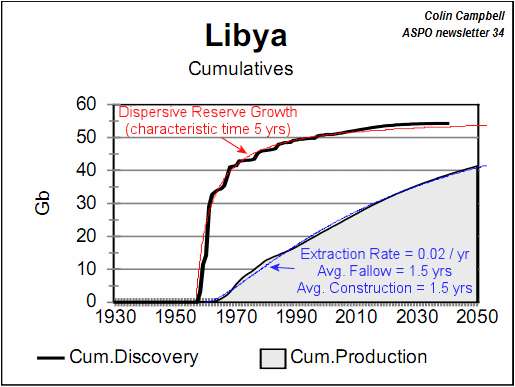
Seems reasonable, with Libya being one of the few remaining exporters by 2050.
Is there any equivilent data for Algeria? Although the political situation is very different there..
I think the situation means higher prices, after the glut in Oklahoma works itself out.
today situation take impact on oil and gas industry, including oil and gas gift
Isn't this going to have rather a dangerous effect on Italy considering more than a quarter of it's oil comes from Libya? A country hardly in a stunningly good financial situation to begin with.
Hi.
Sorry if this is a bit off topic: Does anyone have an updated figure 16? This one seems to be from 2007. Would be interesting to see if the forecast held up to reality in the past 3-4 years, in which case we should have begun our travel down the slope past peak oil.
I have the one from 2008, published here at TOD. Unfortuntely nations have been moved around a bit in the diagram so it gets hard to follow. But one year later it looks pretty much to hold. Not much changes in a few years.
I cannot see Irak on this figure, yet it will have a major role in the future regarding oil exports.
A musical/visual salute to the brave young activists of Libya:
http://www.youtube.com/watch?v=PGx25qIgQbg
Libya still has a lot of oil (45 Gb) and the country is largely unexplored.
http://www.eia.doe.gov/cabs/Libya/Oil.html
BP gives Libya a R/P of 73 years, one year less than KSA.
http://www.bp.com/liveassets/bp_internet/globalbp/globalbp_uk_english/re...
Enough of the HL silliness.
Facts on Libya O&G facilities w/Import, Export, Production, and Consumption Data
also from IEA
I was watching the Libya twitters go by on Al Jazeera
an this came by
That could be a 'brilliant' move, I'd love to see where he actually did that.
edit: well it was Saif El Islam Gaddafi doing the talking "Libyans who live in London, and live in New York, and Manchester, and in Germany, and in Canada, they are inciting you and asking you, you know, and inciting you to come against, to stand again, to stand against. To live in there they have health care. And you, and your kids come and die outside the army barracks." Have to trust the translator on that myself. "Canada" is clearly said by Saif in the clip.
Polonius:
[Aside] Though this be madness, yet there is method in't
The article the twitters were running next to said no Libyans were manning the border when the correspondent came through
"All along the border, we didn't see one policeman, we didn't see one soldier and people here told us they [security forces] have all fled or are in hiding and that the people are now in charge, meaning all the way from the border, Tobruk, and then all the way up to Benghazi.
"People tell me it's also quite calm in Bayda and Benghazi. They do say, however, that 'militias' are roaming around, especially at night. They describe them as African men, they say they speak French so they think they're from Chad."
Can't imagine any neighboring countries being interested in Libya's assets.